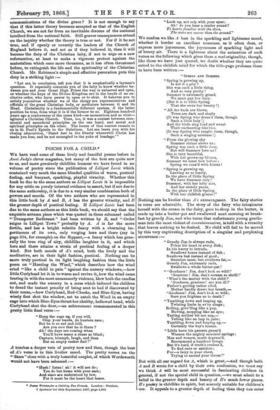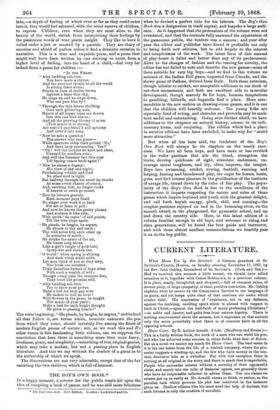POEMS FOR A CHILI).*
WE have read some of these lively and fanciful poems before in Aunt Judy's clever magazine, but many of the best are quite new to us, and more genuinely childlike humour we have found in no volume of poetry since the publication of Lilliput Levee which contained very much the same blended qualities of warm, poetical feeling, and buoyant, sparkling, playful vivacity. Whether this book be due to the same authors as Lilliput Lev& it is impossible for any critic on purely internal evidence to assert, but if not due to the same authorship, it is due to a very similar combination both of powers and moods. Of the two authors who are represented in this little book by A and B, A has the greater vivacity, and B the greater depth of poetical feeling. If Lilliput Levee had been due to the same authors as this little book, we should say that the 'exquisite autumn piece which was quoted in these columnsf called " Trumpeter Redbreast " had been written by B, and " Order reigns in Lilliput Town" probably by A. A is far the more fertile, and has a bright volatile fancy with a charming im- pertinence of its own, only verging here and there (say in page 304, for example) on the flippant,—a fancy which has gene- rally the true ring of airy, childlike laughter in it, and which here and there attains a strain of poetical feeling of a deeper kind. But both moods of A's mind, both the lively and the meditative, are in their light fashion, poetical. Nothing can be more truly poetical in its light laughing fashion than the little poem on "Hunting the Wind," which describes how the wind cried "like a child in pain" against the nursery windows,—how little Curlyhead let it in to warm and revive it, how the wind came tearing in with the moat unmannerly violence, blew both the candles out, and made the nursery in a mess which induced the children to dread the instant penalty of being sent to bed if discovered by their nurse,—how Curlyhead, Red-Cheeks, and Blue-Eyes, having wisely first shut the window, sat to catch the Wind in an empty cage into which Blue-Eyes thrust her chubby, hollowed hand, while Curlyhead shut the door,—an achievement, commemorated in this pretty little final verse:— "Hang the cage up, if you will, Clap your hands, ye hunters rare ; But he is so sad and still, Are you sure that he is there ? Ah ! the days are coming when You'll have many a chase as blind; Capture, triumph, laugh, and then But an empty casket find !"
A touches a deeper vein of poetry now and then, though the best of A's verse is in this livelier mood. The pretty verses on the " Stem " close with a truly beautiful couplet, of which Wordsworth would not have been ashamed :— "Hush ! listen! ah ! it will not do ;
You do but listen with your ears ; And stars are understood by few, For it must be the heart that hears.
* roans Writtersfor a Child by Two Friends. London : Strahan. t Spectator for 28th September, 1867, page 1,092. "Look up, not only with your eysi; Ah! do you hear a tender sound? To hearts familiar with the skies, The stars are nearer than the ground" We confess we like A beat in the sparkling and lightsome mood, whether it border on excellent nonsense, as it often does, or express mere joyousness, the joyousness of sparkling light and of breezy air. There is a lightness about the animation of such verses as the following which gives them a real originality, though, like those we have just quoted, we doubt whether they are quite suited to the childish mind for which the title-page professes them to have been written :—
" SPRING AND &MUM
" Spring is growing up, Is not it a pity ?
She was such a little thing, And so very pretty !
Summer is extremely grand, We must pay her duty. (But it is to little Spring That she owes her beauty !) " All the buds are blown, Trees are dark and shady (It was Spring who dress'd them, though Such a little lady !) And the birds sing loud and sweet Their enchanting hist'ries.
(It was Spring who taught them, though, Such a singing mistress !) "..From the glowing sky Summer shines above us ; Spring was such a little dear, But will Summer love us? She is very beautiful, With her grown-up Misses, Summer we must bow before ; Spring we coax'd with kisses !
"Spring is growing up, Leaving us so lonely, In the place of little Spring We have Summer only ! Summer, with her lofty airs, And her stately paces, In the place of little Spring, With her childish graces !"
Nothing can be livelier than A's extravagance. The fairy stories in verse are admirable. The story of the fairy who intoxicates herself with the cream in the dairy, goes to sleep in the butter, is made up into a butter-pat and swallowed next morning at break- fast by greedy Jim, and who turns that unfortunate young gentle- man into the most violent of convulsionnaires, is told with a vivacity that leaves nothing to be desired. No child will fail to be moved by this very captivating description of a singular and perplexing occurrence :- "Greedy Jim is always rude, Pokes his hand in every dish; In his hurry to intrude,
Swallows bones instead of fish ; Swallows bad instead of good ;
Snatches meat, but swallows fat,—
Greedy Jim, extremely rode, Swallows a whole butter-pat !
" ' Goodness ! Jim, don't look so wild!' 'Gracious ! Jim, don't scream so shrill !' 'What's the matter with the child ?'
Goodness, gracious! are you ill?' Father's getting rather riled, Mother hardly draws her breath,— 'Goodness! Jim, don't look so wild ; Sure you frighten us to death!'
"Tumbling down and leaping up, Twisting limbs in ev'ry shape ;
Rolling, grov'lling like a pup, Mowing, mopping like an ape ;
Tasting neither bit nor sup,— Yelling like an imp in pain; Tumbling down and leaping up,— Certainly the boy's insane.
" Little have his parents guese'd Whence the mighty mischief springs ; Men and women, much depreas'd, Recommend a hundred things. But it's hard, if truth's confess'd, To find cure or antidote ; For—a fairy in your chest, Trying to ascend your throat!"
But with all our regard for A, which is great,—and though both A and B wrote for a child by their own confession, we must say we think A will be most successful in fascinating children in general, if not the special child in question,—we must admit to a belief in the greater depth and beauty of B's much fewer pieces. B's poetry is childlike in spirit, but scarcely suitable for children's use. It appeals to a greater depth of feeling than they can enter
into,—a depth of feeling of which even so far as they could enter into it, they would feel ashamed, with the usual reserve of children, to express. Children, even when they are most alive to the beauty of the world, shrink from interpreting their feelings by the passionate words of true poetic insight. They like to have it veiled under a jest or masked by a parable. They are chary of emotion and afraid of pathos unless it find a dramatic occasion in narrative. This is a true and exquisite poem, and a poem that might well have been written by one striving to enter, from a higher level of feeling, into the heart of a child,—but very far indeed from a poem for children:-
"L'ME FIELDS.
" Airy budding ash-tree, You have made a throne, And the sweetest thrush in all the world Is sitting there alone ; Drawn in tints of tender brown Against a keen blue sky, He sings up and he sings down, Who can pass him by ?
"Through the thin leaves thrilling Goes each glittering note, Hearts of all happy trees are drawn Into this one bird-throat ; And all the growing blooms of morn (This music is so strong) Are reach'd and blend'd and upborne And utter'd into song.
"Now he asks a question !
The answer who can guess—
While sparrows chirp their pettish 'No,' And claws keep murmuring Yes?'
" Oh ! will the months be kind and clear, lInvex'd by needless rain ; And will the Summer last this year Till Spring comes back again ?'
" Now he states a dogma!
His view of day and night;
Proclaiming volubly and loud No other bird is right.
But halfway through his creed he checks At some sweet chance of sound, And, catching that, no longer reeks If heaven or earth go round.
"Now he labours gravely, Each moment pays itself, No singer ever work'd so hard For art or fame or pelf ; And now he knows the pretty phrase And scatters it like rain, With quick da capos ' of self-praise, Till the tree rings again.
"He pleads, he laughs, he argues, He shouts to sky and earth; The wild notes trip each other up In ecstasies of mirth ; He drinks the azure of the air, He tosses song about, Like a girl's tangle of gold-hair, Spray-wet and shaken out.
" 0 world! when spring is shining And dark winds stand aside, Let men think of you as they may, The birds are satisfied ; Their dauntless hymns of hope arise With such a wealth of will ; Though every year the summer dies, They trust her promise still.
"Airy budding ash-tree, Try to show your power, Make a leaf for each gay note He makes in half an hour !
Wild flowers in the grass, be taught The music of your parts ; Make a bud for each bright thought He gives to passing hearts !"
The verse beginning, "He pleads, he laughs, he argues," and indeed all that follow it, are verses which, however unknown the pen from which they come, should certainly live among the finest of modern English poems of nature ; nor, as we read this and B's other verses in this fascinating little volume, can we suppress the conviction that here there is something more than mere fancy, liveliness, grace, and simplicity,—something of true original genius, which may take a modest, but not a passing place in English literature. And this we say without the shadow of a guess as to the authorship of which we speak.
The illustrations are not very admirable, except that of the fox escorting the two children, which is full of humour.































 Previous page
Previous page